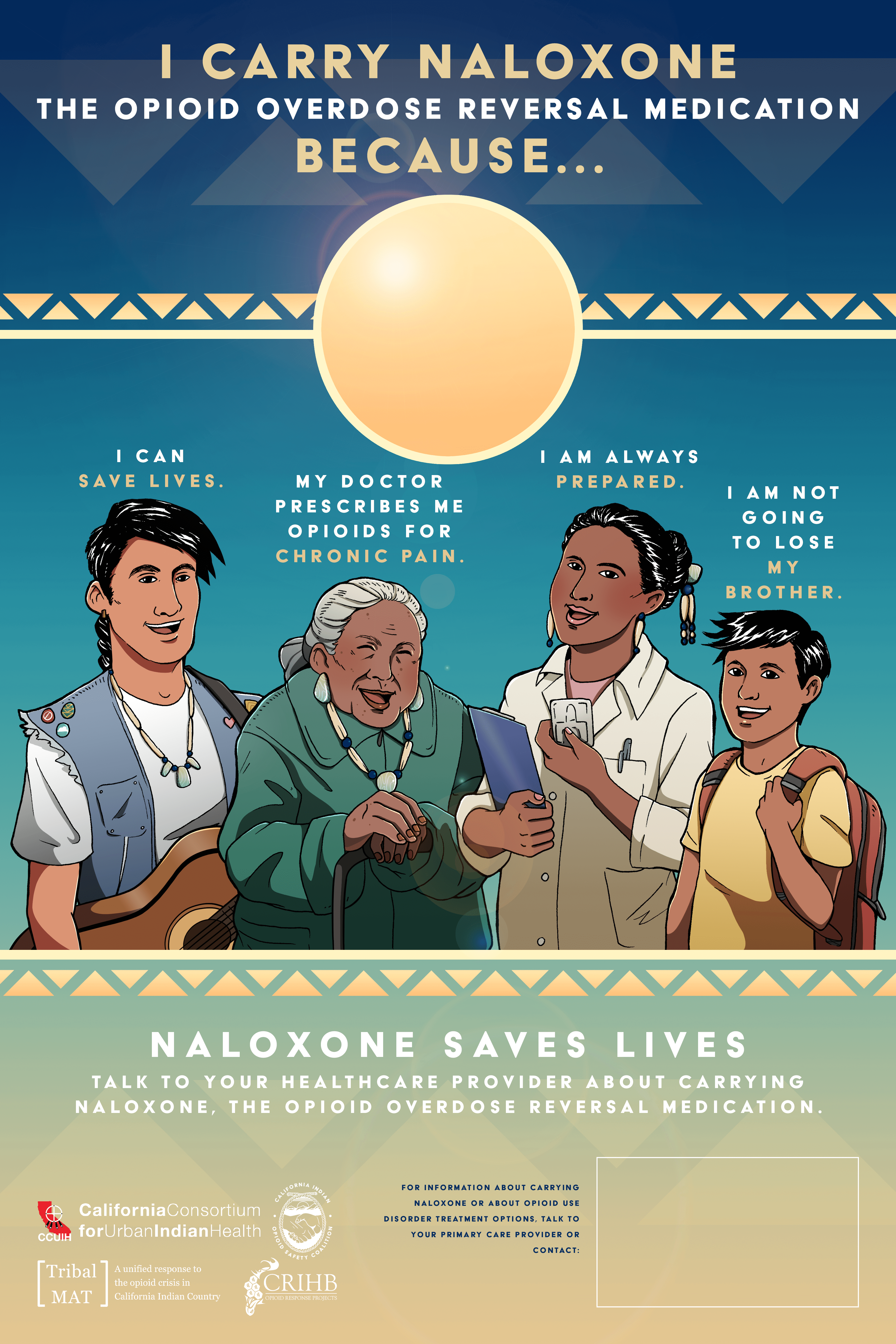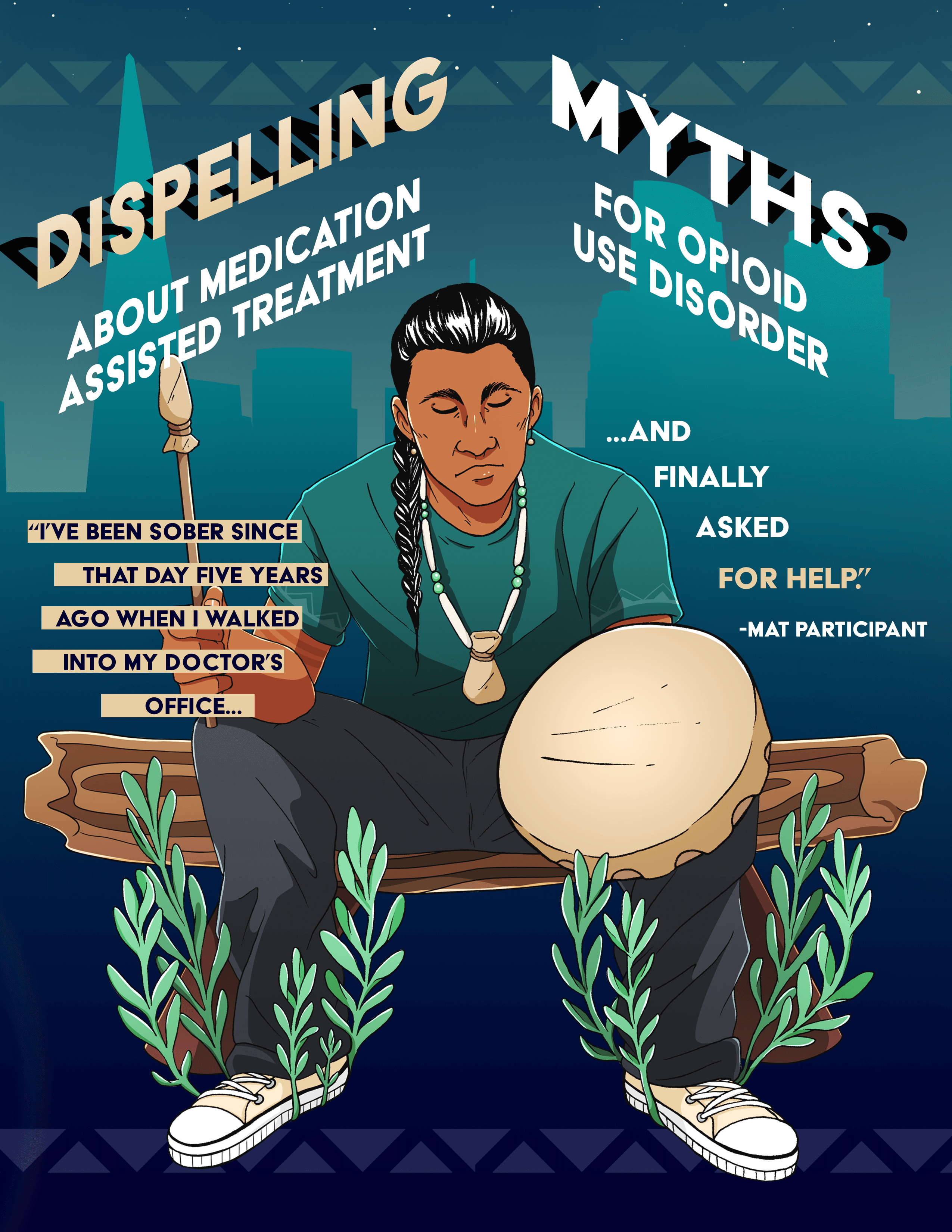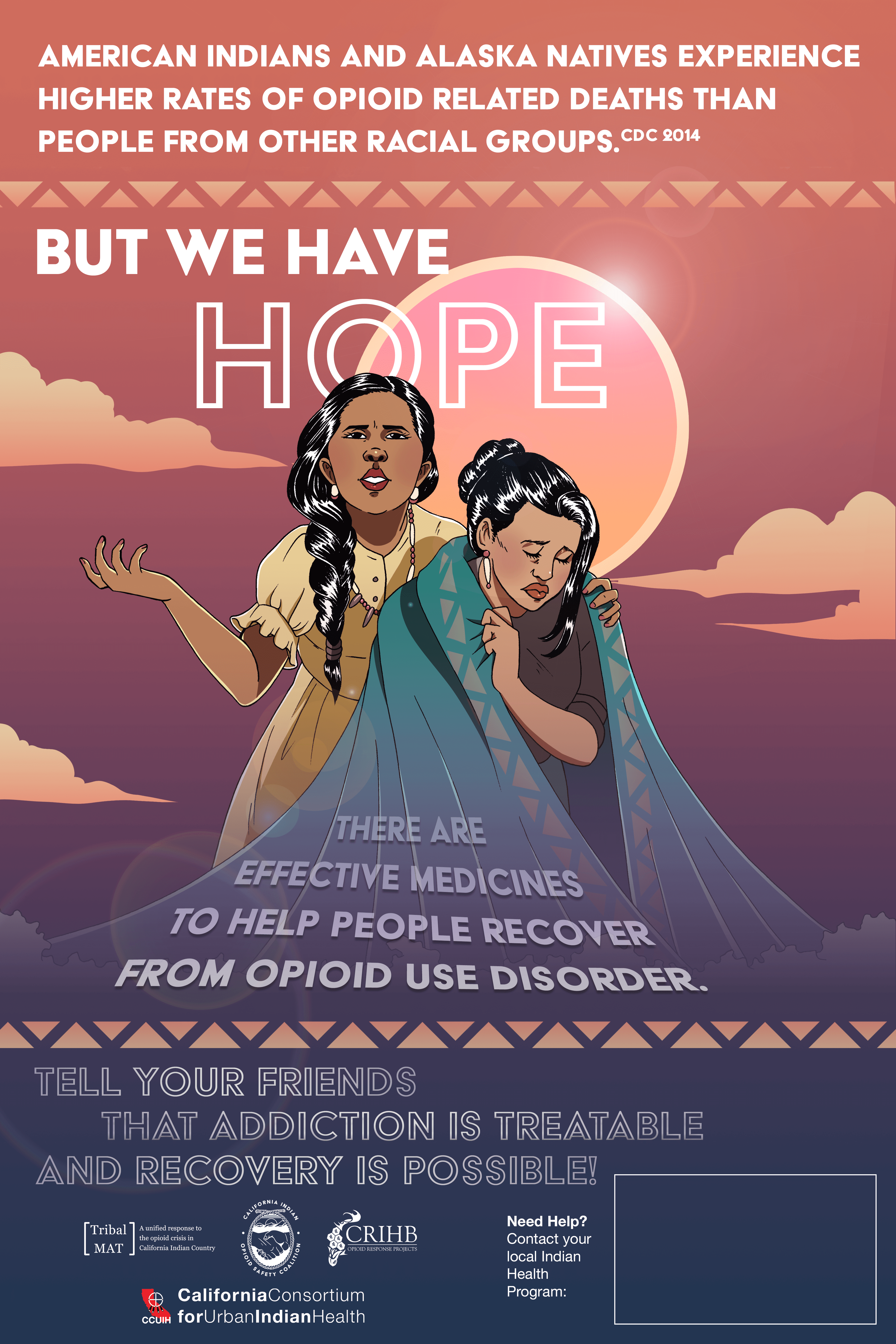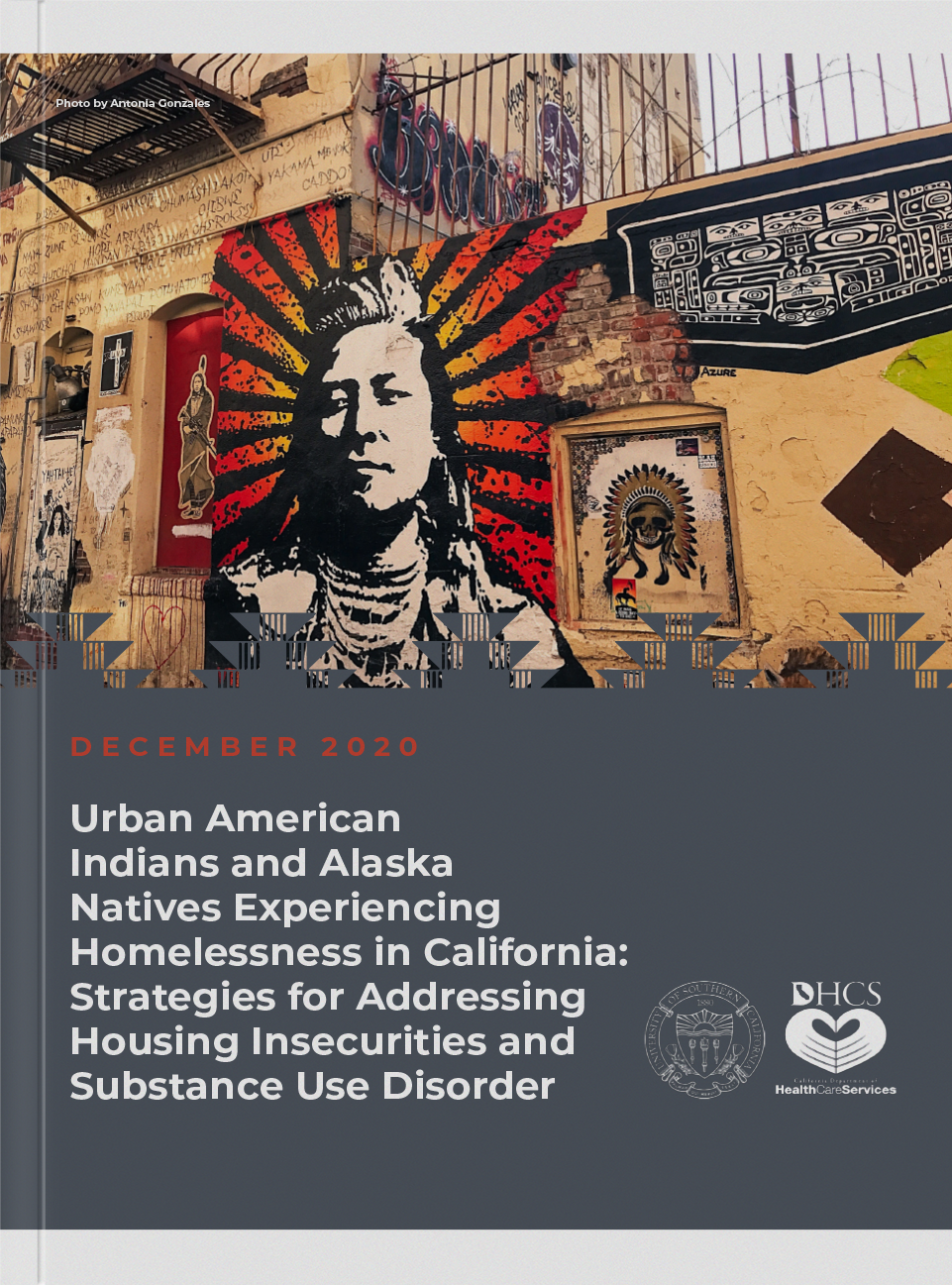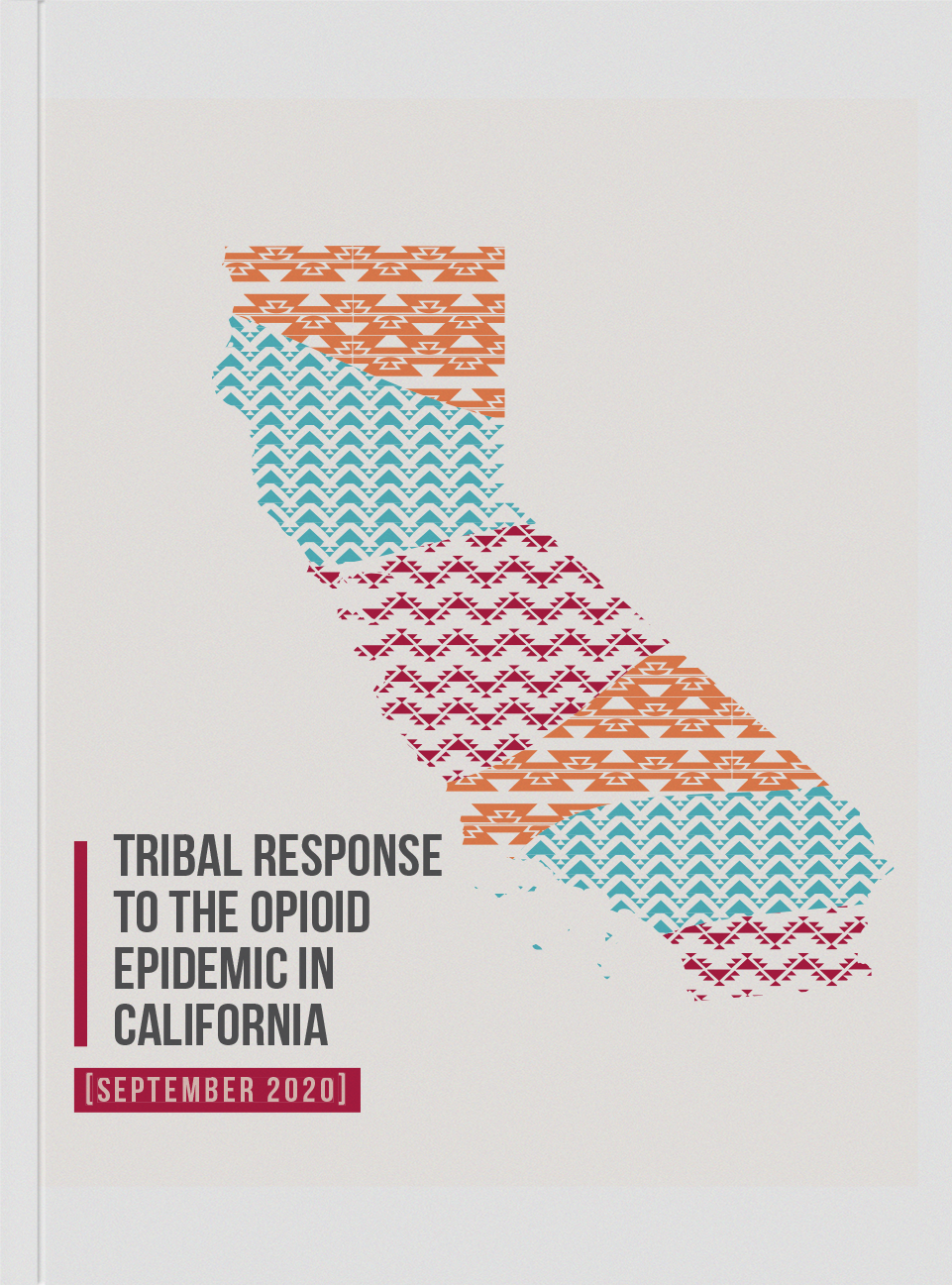Resources for Tribal and Urban Indian Populations Addressing the Opioid Epidemic in Indian Country
Tribal Medication-Assisted Treatment (TMAT) Project Materials
The Tribal Medication-Assisted Treatment (TMAT) Project was created by the Department of Health Care Services (DHCS) to “promote opioid safety, improve the availability and provision of MAT, and facilitate wider access to naloxone (Narcan) with special consideration for Tribal and Urban Indian values, culture, and treatments.” This work is “focused on sharing knowledge among Tribal and Urban Indian communities, Tribal and Urban Indian health programs, and community-based partners on best practices for prevention, treatment and recovery from opioid use disorder, stimulant use disorders, and other co-occurring substance use disorders in California Indian Country.”
As a part of the TMAT Project, many materials and resources have been created to train and educate California American Indian and Alaska Native (AIAN) community members, Tribal and Urban Indian providers, and other individuals serving AIAN communities. These materials and resources have been gathered here to make them easily accessible to all who would like to use them.
To learn more about the TMAT Project, click here to visit the DHCS TMAT website.
Jump to Section
General MAT Materials
The materials below provide general information about medication-assisted treatment (MAT) (also called medications for opioid use disorder (MOUD)), which is the use of both medication and counseling as a treatment method for opioid use disorders. (FDA)
We Can Break the Cycle” Poster
This poster provides basic information about MAT and encourages people to ask their providers about MAT.
Produced by CCUIH
Hope Without Stigma Booklet
This booklet presents information about opioids and how to recognize and respond to an opioid overdose, including naloxone (Narcan) administration.
Produced by CCUIH
Medication-Assisted Treatment Poster
This one-page poster shows how MAT can be used in Native communities to overcome opioid use disorder.
Produced by CCUIH
Opioid Overdose Brochure
This booklet presents information about opioids and how to recognize and respond to an opioid overdose, including naloxone (Narcan) administration.
Produced by CCUIH
Continuum of Care in Addictive Disorders Webinar
This webinar presents the American Society of Addiction Medicine Placement Criteria levels of care, the “continuum of care” concept, and discusses its relevance to outpatient MAT.
Produced by TeleWell
Buprenorphine for Pain Management: A Care-Managed Approach Webinar
This webinar explains how to develop a new pathway of care for patients living with non-malignant chronic pain on long-term opioid therapy in a primary care setting.
Produced by TeleWell
Treatment of Co-occurring Conditions in Outpatient MAT Programs Webinar
This webinar informs providers about some of the more common conditions that co-occur with opioid use disorders and discusses treatment options.
Produced by TeleWell
Treatment of Pain in the MAT Patient Webinar
This webinar addresses the common problem of pain in MAT patients and evidence-based approaches to addressing this.
Produced by TeleWell
The Essentials for a Best Practice Multi-Disciplinary MAT Program Webinar
This booklet presents information about opioids and how to recognize and respond to an opioid overdose, including naloxone (Narcan) administration.
Produced by TeleWell
Medication-Assisted Treatment for Everybody Webinar
This booklet presents information about opioids and how to recognize and respond to an opioid overdose, including naloxone (Narcan) administration.
Produced by TeleWell
Naloxone (Narcan) Materials
The materials below provide general information about naloxone (Narcan), which is a medication used to reverse an opioid overdose. (CDC)
Naloxone Saves Lives Poster
This poster encourages people to ask their providers for life-saving naloxone (Narcan) medication.
Produced by CCUIH
Naloxone 101 Fact Sheet
The materials below provide general information about naloxone (Narcan), which is a medication used to reverse an opioid overdose.
Produced by CRIHB
Harm Reduction Materials
The Native-specific materials below provide general information about harm reduction, which is a set of practices and policies that seek to reduce the negative consequences of drug use. Harm reduction can address stigma, infections, lack of accessibility to services, etc. by equipping people who use drugs with “life-saving tools and information to create positive change in their lives and potentially save their lives.” For example, needle exchange programs and fentanyl test strips help keep our relatives as safe as possible when they are not yet ready to give up using substances. (SAMHSA)
Harm Reduction Saves Lives: Fentanyl Overdose Flyer
This flyer shows the high chances of unintentional fentanyl overdose from street drugs.
Produced by CRIHB
First Do No Harm
This webinar discusses harm reduction, low-threshold care, and diversion (prescription drugs being transferred to individuals other than who they were prescribed for) for opioid and other substance use disorders.
Produced by TeleWell
Stigma Materials
The materials below provide general information about stigma regarding substance use disorder, which is a key barrier to receiving treatment. (Johns Hopkins)
What is Stigma? Flyer
This flyer describes what substance use disorder stigma is, what it looks like, and the effects it can have.
Produced by CRIHB
Stigmatizing Language Flyer
This flyer provides alternative terms so that stigmatizing language can be avoided.
Produced by CRIHB
Addressing Barriers to Care: Stigma Webinar
This webinar discusses the stigma associated with MAT implementation.
Produced by TeleWell
Trauma Materials
The materials below provide general information about trauma, including historical trauma experienced by AIAN populations, and how it can lead to substance abuse. “Research demonstrates a strong link between exposure to traumatic events and substance use problems. Many people who have experienced child abuse, criminal attack, disasters, war, or other traumatic events turn to alcohol or drugs to help them deal with emotional pain, bad memories, poor sleep, guilt, shame, anxiety, or terror.” (ISTSS)
Understanding Trauma as a Common Root Cause of Addiction Flyer
This flyer explains trauma and its relationship to substance use disorder.
Produced by CRIHB
Addressing Barriers to Care: Historical Trauma Webinar
This webinar explores the psychosocial artifacts of historical trauma and how they became barriers to treatment today.
Produced by TeleWell
Adverse Childhood Experiences and a Trauma-Informed Approach in MAT Webinar
This webinar discusses adverse childhood experiences and how they are relevant to the development of substance use disorders and MAT. It will also discuss the role of stigma and the need for a trauma-informed approach.
Produced by TeleWell
Fentanyl Materials
The materials below provide general information about fentanyl, which is a very powerful synthetic opioid used as a pain reliever in medical settings. Illegally made fentanyl and other synthetic opioids are the most common drugs involved in overdose deaths. Even in small doses, fentanyl can be deadly. (CDC)
Opioid Use and Other Substance Use Disorder Materials
The materials below provide general information about opioid use disorder, which is the use of opioids “even when the person wants to stop, or when it negatively affects a person’s physical and emotional well-being.” (Johns Hopkins)
Dispelling Myths About Medication-Assisted Treatment for Opioid Use Disorder Brochure
This brochure dispels nine common myths about MAT by presenting the facts.
Produced by CCUIH
We Have Hope Poster
This poster shares that despite grim statistics, addiction is treatable, and recovery is possible.
Produced by CCUIH
Be Safe: Pain Management Poster
This poster encourages people to talk to their providers about the safest pain management options to prevent addiction.
Produced by CCUIH

Addressing Stimulant Use Webinar
This training describes the local and national scope of stimulant use, including current trends in use amongst Indigenous people in California and nationally. A free account must be created to access this webinar.
Produced by UCLA
Brief Review of Addictive Disorders Webinar
This webinar sets the stage for the series by discussing the basics of addictive disorders and their treatment.
Produced by TeleWell
The Neurobiology of Addiction Webinar
This webinar presents recent advances in the understanding of the neuroscience of addictive disorders.
Produced by TeleWell
Medication-Assisted Treatment (MAT) for Opioid Use Disorder Webinar
This webinar provides a general overview of the opioid epidemic, explores buprenorphine as a treatment option for opioid use disorder, and discusses different phases of treatment for opioid use disorder.
Produced by TeleWell
Culturally Centered Care Materials
The materials below provide general information about integrating culture into substance use disorder care, which is considered by many to be an essential component of effective care.

Reclaiming Native Psychological Brilliance Webinar
This training for California Tribal and Urban Indian providers offers a strength-based and historically reclaimed portrayal of the innate psychological brilliance of Native people––past and present. A free account must be created to access this webinar.
Produced by UCLA

Providing Culturally Responsive Substance Use Disorder Treatment in Indigenous Communities Webinar
This training for California-based Tribal and Urban Indian health care providers features clinical strategies to infuse indigenous culture into evidence-based practice. A free account must be created to access this webinar.
Produced by UCLA

Engaging Native People and Their Families through Relationships Webinar
This training for California providers focuses on an overview of indigenous psychology and features cultural-clinical approaches congruent with a Native way of knowing. A free account must be created to access this webinar.
Produced by UCLA

CommUnity Connections: Bridging Best Practice and Cross-Cultural Care Webinar
This training is a statewide convening that brings together Tribal/Urban Indian and other substance use treatment providers to improve culturally informed care for Native people in California. A free account must be created to access this webinar.
Produced by UCLA

A Sacred Trust: Decolonizing Screening and Assessment Webinar
This training explores how for Western psychological screening and assessment has left American Indian people without tools to adequately address psychological conditions. A free account must be created to access this webinar.
Produced by UCLA

Addressing Cultural Identity in Substance Use Treatment among American Indian/Alaska Native Webinar
This training explores how integrating culture into clinical practice can increase treatment engagement and success, especially in AIAN communities. A free account must be created to access this webinar.
Produced by UCLA
Native American Cultural Integration in Substance Use Disorder Treatment Webinar
This webinar explores the integration of Native cultural elements into substance use disorder treatment.
Produced by TeleWell
Culturally Based Modalities in Substance Use Disorder Treatment Webinar
This webinar discusses the importance of culturally based modalities in the treatment of substance use disorders in Native communities.
Produced by TeleWell
Community Reports
Mapping the Network of Care: Substance Use Treatment and Recovery Services for American Indians and Alaska Natives in California
This report details the efforts and results of data gathered from California Tribal and Urban Indian Health Programs and community-based treatment programs to understand the recovery services available and gaps in services that need to be addressed to reduce substance use disorder (SUD).
Produced by USC
Urban American Indians and Alaska Natives Experiencing Homelessness in California: Strategies for Addressing Housing Insecurities and Substance Use Disorder
This report focuses on access to substance use treatment among urban American Indian and Alaska Native (AIAN) experiencing homelessness.
Produced by USC
Addressing the Opioid Crisis in American Indian & Alaska Native Communities in California: A Statewide Needs Assessment
This report aims to identify gaps in prevention, treatment, and recovery services (including MAT) for American Indian & Alaska Native communities in California. (Executive summary (link)).
Produced by USC
Tribal Response to the Opioid Epidemic in California: A Community Report
This report evaluates the efforts and progress of five organizations serving American Indian and Alaska Native (AIAN) in California regarding opioid use disorder and MAT.
Produced by USC
Miscellaneous Materials
These materials cover topics related to substance use disorder or MAT not otherwise categorized above.

Overview of Tribal/Urban Indian Health System Webinar
This training is an introduction for providers not familiar with IHS programs and services available to Tribal and Urban Indians in California. A free account must be created to access this webinar.
Produced by UCLA

Indigenous Health and the Opioid Epidemic Webinar
This training provides an overview of the impact of trauma, genetic risk and resilience, molecular epidemiology, and substance use in AIAN. A free account must be created to access this webinar.
Produced by UCLA
Overview of Contingency Management in Native Communities Webinar
This training provides an overview of the theory and evidence of contingency management within Native Americans.
Produced by UCLA
Fentanyl Testimony to the US Senate Committee on Indian Affairs
On November 8, 2023, Claradina Soto, PhD, MPH, associate professor of clinical population and public health sciences at the Keck School of Medicine of USC, testified during a hearing, held by the United States Senate Committee on Indian Affairs, on the growing crisis of fentanyl in Native American communities. Read the full article here.
Download the full testimony below.







